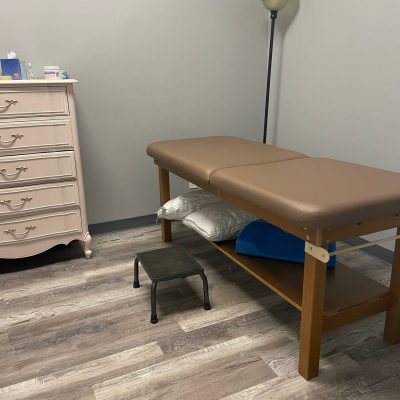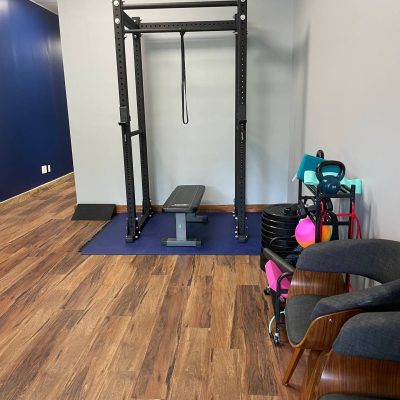Most times when we talk about pelvic health we hear it in reference to women, men have pelvic floors, too. Just like women, men can get pelvic floor dysfunction. Pelvic floor dysfunction can affect men of all ages!
Due to differences in anatomy and childbirth, women are often more susceptible to pelvic floor disorders, but men often suffer from many of the same issues like urinary incontinence, constipation, pain, and sexual dysfunction.
Let’s talk a little about male anatomy. Males lack a vagina, but they have a prostate (a large gland that makes secretions for sperm) that sits underneath the bladder. In males, the urethral canal, where urine leaves the body, is much longer than in females.
Even though there are differences, males still have a pelvic floor comprised of many of the same muscles and ligaments as women. The male pelvic floor also supports their pelvic organs and controls urination, bowels, sexual function, and spinal health.
When the pelvic floor muscles aren’t working properly, we can start to see the same issues as women. The pelvic floor muscles might be weak, tight, or may have a coordination problem.
SO WHAT PROBLEMS CAN THE PELVIC FLOOR MUSCLE CAUSE?
Incontinence
Men can suffer from incontinence which is ANY INVOLUNTARY leakage of urine. Even if it is just a few drops of leakage, this counts as incontinence! Several conditions can contribute to this including an enlarged prostate (BPH), prostate cancer, weak pelvic floor muscles, and overly tight pelvic floor muscles.
1 in 7 men is diagnosed with prostate cancer making it the second most common type of cancer in males. Sometimes prostate cancer requires a radical prostatectomy surgery, , where the prostate is removed. After this surgery, up to 87% of men have incontinence 6 months later.
Removing the prostate decreases the physical support of the bladder. The bladder normally sits on top of the prostate, and removing the prostate can let the bladder fall slightly, contributing to bladder leakage.
Research has shown that pelvic floor muscle training BEFORE prostate removal surgery can help to improve symptoms like urine control and erectile dysfunction.
If the prostate is larger than normal as in BPD, this can cause extra pressure on the bladder and urethra, making you have to go more frequently and also experience increased urinary urge.
Sexual Dysfunction
The pelvic floor muscles help with arousal, pleasure, and orgasm during sex. If they aren’t working properly, this can lead this can lead to erectile dysfunction, leaking urine with orgasm, premature ejaculation, and anorgasmia (lack of orgasm). Pelvic floor muscle training (and not just doing kegels!) can help with these problems.
Pelvic Pain
Just like women, men can suffer from chronic pelvic pain, often called “chronic prostatitis.” Often accompanied by pelvic pain in men and women are urination problems, sexual dysfunction, and depression. After seeing a healthcare provider to rule out an infection, seek help from a Pelvic Floor Physical Therapist! Pelvic pain can be caused by your pelvic floor muscles! Muscles in and around the pelvic floor can become tight and painful just like any other muscle in your body, leading to pain. But the good news is, these muscles can be treated and retrained like the rest of our muscles.
Diastasis Recti
You may have heard of a diastasis recti in pregnant women, but they can occur in men, especially as they age. A diastais recti is a separation or widening of the linea alba between the rectus abdominis muscles of the abdomen. Basically, the tissue between your “six pack” muscles becomes stretched or separated. This can cause bulging of the abdomen, especially with activities that stress that area, such as with lifting and sitting up. Diastasis recti in men can cause low back pain and decreased efficiency of the pelvic floor muscles, which can lead to bladder, bowel, and sexual dysfunction.
What Can a Pelvic Floor Therapist Do for Male Pelvic Health?
The good news is that pelvic floor physical therapy can help to address all of these issues! An expert pelvic floor physical therapist will develop and coordinate a treatment plan especially for you. We will talk with you and discuss your concerns privately. The therapist will ask questions about your medical history, bladder and bowel function, and sexual function to better understand your condition and to develop a treatment plan that is customized to you. After the examination, the pelvic floor therapist may give you
exercises, diet modifications, and other tips to help manage and improve your symptoms.
Men, are you ready to take control of your pelvic floor issues?
Ask your healthcare provider for a referral to a Pelvic Floor Physical Therapist who specializes in seeing men. Give us a call today! We treat men in the Birmingham, AL area and are also able to treat clients virtually!







